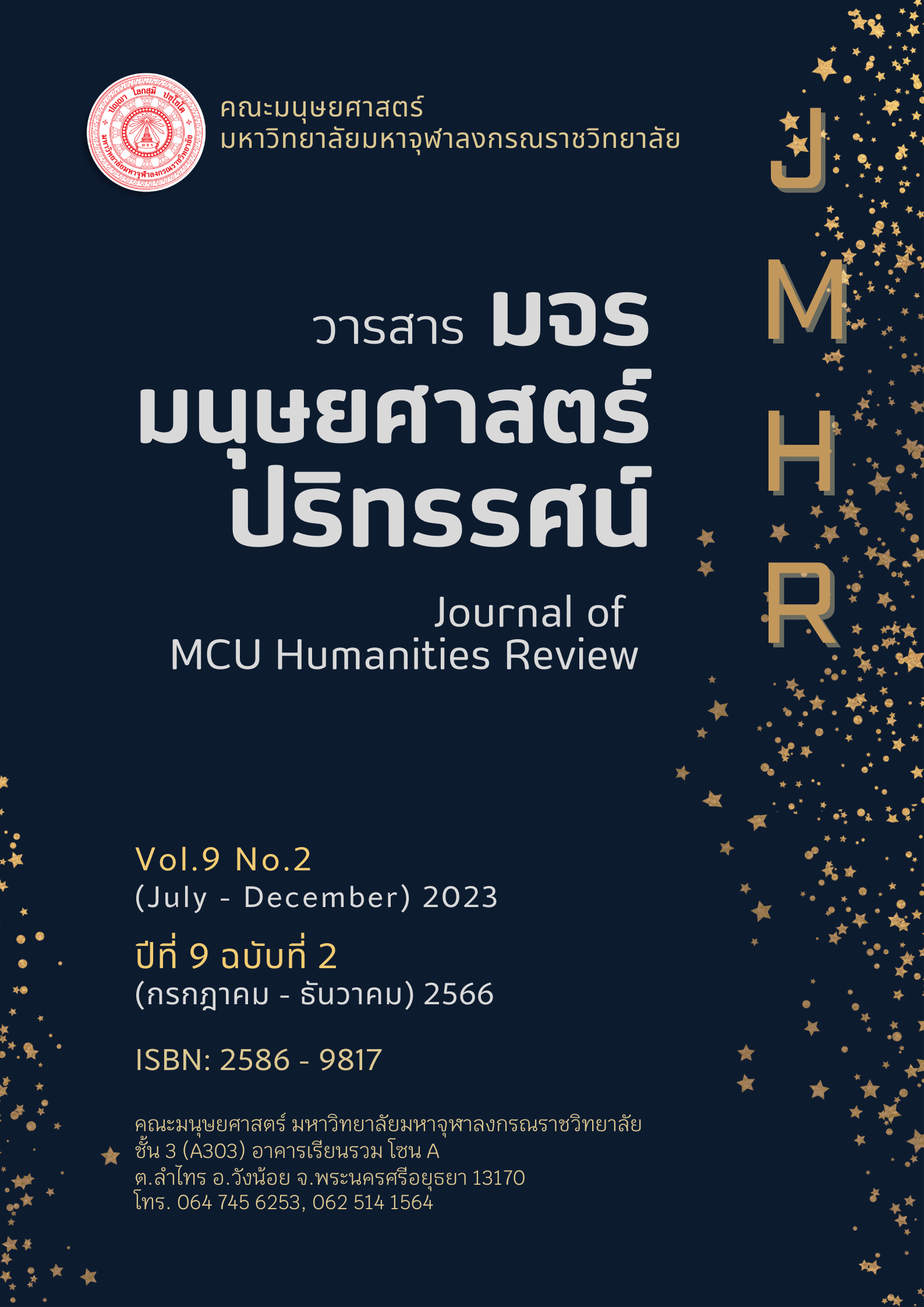รูปแบบพุทธจิตวิทยาสร้างเสริมสุขภาวะองค์รวมของผู้ประกอบวิชาชีพบัญชี
คำสำคัญ:
รูปแบบ, พุทธจิตวิทยา, สุขภาวะองค์รวม, วิชาชีพบัญชี, ไตรสิกขา, ภาวนา 4บทคัดย่อ
การวิจัยนี้มีวัตถุประสงค์ 1. เพื่อศึกษาหลักการแนวคิดทฤษฎีที่เกี่ยวข้องกับการสร้างเสริมสุขภาวะองค์รวมของผู้ประกอบวิชาชีพบัญชี 2. เพื่อสร้างรูปแบบพุทธจิตวิทยาสร้างเสริมสุขภาวะองค์รวมของผู้ประกอบวิชาชีพบัญชี และ 3. เพื่อนำเสนอรูปแบบพุทธจิตวิทยาสร้างเสริมสุขภาวะองค์รวมของผู้ประกอบวิชาชีพบัญชี เป็นการวิจัยเชิงคุณภาพ ระยะที่ 1 การเขียนรูปแบบ และระยะที่ 2 การนำเสนอรูปแบบ โดยรวบรวมข้อมูลจากเอกสารและบทความที่เกี่ยวข้อง สัมภาษณ์เชิงลึกผู้เชี่ยวชาญและผู้ทรงคุณวุฒิ 18 คน การสนทนากลุ่มผู้เชี่ยวชาญและผู้ทรงคุณวุฒิ 12 คน การจัดประชุมผู้เชี่ยวชาญพิเศษเพื่อให้การรับรองรูปแบบที่ได้ จำนวน 7 คน ใช้การวิเคราะห์เชิงคุณภาพด้วยการวิเคราะห์เนื้อหา
ผลการวิจัยพบว่า 1. แนวคิดทฤษฎีที่เกี่ยวข้องกับการสร้างเสริมสุขภาวะองค์รวมของผู้ประกอบวิชาชีพบัญชี มีอยู่หลายทฤษฎีประกอบด้วยหลักพุทธธรรม 2 หลักคือ หลักไตรสิกขา หลักภาวนา 4 และหลักจิตวิทยา 2 หลักคือ หลักทฤษฎีแนวคิดเชิงบวกของ PERMA Model และหลักทฤษฎีการปรับตัวของรอย ซึ่งสอดคล้องเหมาะสมกับการสร้างเสริมสุขภาวะองค์รวมของผู้ประกอบวิชาชีพบัญชี 4 ด้านคือ ด้านร่างกาย ด้านจิตใจ ด้านสังคม และด้านปัญญา 2. การสร้างรูปแบบพุทธจิตวิทยาสร้างเสริมสุขภาวะองค์รวมของผู้ประกอบวิชาชีพบัญชีเป็นการบูรณาการ 3 ศาสตร์แห่งปัญญาเข้าด้วยกัน คือ พุทธธรรม จิตวิทยาและการประกอบวิชาชีพบัญชี เพื่อได้รูปแบบสร้างเสริมสุขภาวะองค์รวมของผู้ประกอบวิชาชีพบัญชี และ 3. รูปแบบพุทธจิตวิทยาสร้างเสริมสุขภาวะองค์รวมของผู้ประบวิชาชีพบัญชีที่ได้จากการวิจัยนี้ คือ “SURIYO Model” ประกอบด้วย 1) Strength ความแข็งแรงเข้มแข็งของร่างกายและจิตใจ 2) Understanding ความเข้าใจอย่างถูกต้องตามความเป็นจริง 3) Relationship ความมีสัมพันธภาพที่ดีกับเพื่อนร่วมงานและสังคม 4) Integrity ความซื่อสัตย์ในวิชาชีพ ตนเอง ความคิดและการกระทำ 5) Youth ความรู้สึกมีชีวิตชีวาทั้งร่างกายและจิตใต และ 6) Opportunity การเห็นโอกาสทุกชั่วขณะแม้ในวิกฤติ เห็นโอกาสความก้าวหน้าในวิชาชีพเป็นการพัฒนาสร้างเสริมตนเองของผู้ประกอบวิชาชีพ 6 ด้าน เพื่อการสร้างเสริมสุขภาพองค์รวมทั้ง 4 ด้าน โดยผู้เชี่ยวชาญพิเศษได้ให้ความเชื่อมั่นและความสมบูรณ์ของรูปแบบที่ระดับความเห็นเฉลี่ย 4.285 (คะแนนเต็ม 5) ซึ่งแสดงว่ารูปแบบนี้มีค่าความเห็นในการประเมินอยู่ที่ระดับดีถึงดีมากที่สุด สามารถนำไปใช้งานได้
เอกสารอ้างอิง
ชวิน พงษ์ผจญ. (2562). การพัฒนารูปแบบการเรียนรู้วรรณคดีไทยตามแนวคิดจิตวิทยาเชิงบวกโดยใช้รูปแบบ PERMA กับการจัดการเรียนรู้โดยใช้คุณลักษณะที่เป็นจุดแข็งเป็นฐานเพื่อสร้างสุขภาวะของผู้เรียนระดับมัธยมศึกษา. วารสารสังคมศาสตร์และมนุษยศาสตร์, 47(1), 141-142.
ดวงเนตร ธรรมกุล. (2555). การสร้างสุขภาวะในองค์กร. วารสารวิจัยวิทยาศาสตร์สุขภาพ, 6(1), 1-10.
ทิศนา แขมมณี. (2564). ศาสตร์การสอน องค์ความรู้เพื่อการจัดกระบวนการเรียนรู้ที่มีประสิทธิภาพ. กรุงเทพฯ: สำนักพิมพ์จุฬาลงกรณ์มหาวิทยาลัย.
ธนวรรณ แฉ่งขำโฉม. (2562). ตัวแบบการจัดการที่มีประสิทธิภาพในการพัฒนาสมรรถนะของผู้ทำบัญชีในสำนักงานบัญชีคุณภาพในประเทศไทย (ดุษฎีนิพนธ์ปริญญาปรัชญาดุษฎีบัณฑิต). มหาวิทยาลัยสยาม. กรุงเทพฯ.
พรรณทิพา ชเนศร์. (2561). แบบจำลองพุทธจิตวิทยาการบำบัดดูแลและส่งเสริมสุขภาพองค์รวมในแพทย์แผนไทย (ดุษฎีนิพนธ์ปริญญาพุทธศาสตรดุษฎีบัณฑิต). มหาวิทยาลัยมหาจุฬาลงกรณราชวิทยาลัย. พระนครศรีอยุธยา.
พระครูสังฆรักษ์ทวี อภโย. (2563). พุทธจิตวิทยาสำหรับคนชายขอบ. วารสารมหาจุฬานาครทรรศน์, 7(8), 15-29.
พระครูสิริรัตนานุวัตร และคณะ. (2562). รูปแบบและกระบวนการเสริม สร้างสุขภาวะองค์รวมของครอบครัวและสังคม (รายงานวิจัย). พิษณุโลก: วิทยาลัยสงฆ์พุทธชินราช, มหาวิทยาลัยมหาจุฬาลงกรณราชวิทยาลัย.
พระธรรมมงคลวิธาน และคณะ. (2562). การศึกษาตามหลักไตรสิกขาเพื่อพัฒนามนุษย์. Humanities: Social Sciences and arts, 12(1), 890-892.
พระมหาอุดร สุทธิญาโณ. (2554). ศึกษาสุขภาพองค์รวมวิถีพุทธในพระไตรปิฎก (สารนิพนธ์พุทธศาสตรดุษฎีบัณฑิต). มหาวิทยาลัยจุฬาลงกรณราชวิทยาลัย. กรุงเทพฯ.
พิณนภา หมวกยอด. (2561). การพัฒนาศักยภาพนักศึกษาในการสร้างเสริมสุขภาวะทางปัญญา (ดุษฎีนิพนธ์ปริญญาวิทยาศาสตรดุษฎีบัณฑิต). มหาวิทยาลัยศรีนครินทรวิโรฒ. กรุงเทพฯ.
ราชกิจจานุเบกษา. ข้อบังคับสภาวิชาชีพบัญชี ว่าด้วยจรรยาบรรณผู้ประกอบวิชาชีพบัญชี พ.ศ.2561. (2561). (เล่ม 135 ตอนพิเศษ 301ง), 19-20.
ราชบัณฑิตสถาน. (2539). พจนานุกรม ฉบับราชบัณฑิตสถาน พ.ศ.2525. กรุงเทพฯ: อักษรเจริญทัศน์.
รัตนะ ปัญญาภา. (2563). ถอดรหัสแนวคิดเพื่อชีวิตแนวพุทธ. กรุงเทพฯ : สำนักพิมพ์จุฬาลงกรณ์มหาวิทยาลัย.
สมเกียรติ เหลืองศักดิ์ชัย และคณะ. (2562). พุทธวิถี (ไตรสิกขา) : กระบวนทัศน์ใหม่เพื่อการสร้างแบรนด์อย่างยั่งยืนตามศาสตร์พระราชา. วารสารนิเทศศาสตร์ธุรกิจบัณฑิตย์, 13(2), 109-157.
สมเด็จพระพุทธโฆษาจารย์ (ป.อ.ปยุตฺโต). (2563). พุทธธรรมฉบับปรับขยาย. กรุงเทพฯ: สำนักพิมพ์ผลิธัมม์ ในเครือบริษัท สำนักพิมพ์แพ็ทแอนด์โฮม จำกัด.
อนุชา ถาพะยอม. (2563). ผลกระทบของความสามารถในการจัดการความเครียดและทักษะการระหว่างบุคคลต่อประสิทธิภาพการทำงานของนักบัญชี. วารสารนักบริหาร, 40(1), 31-43.
Goldberger and S. Breznitz.(Eds.). Handbook of Stress: Theoretical and Clinical Aspects. New York: Free Press.
Keeves, J. P. (1988). Education research, Methodology and measurement: An International. handbook, New York: Pergamon.
Richard S.L. Folkman S. (1984). Stress, Appraisal, and Coping. New York: Springer, Publishing Company.
Selye, H. (1993). History and present status of the stress concept. In L.
ดาวน์โหลด
เผยแพร่แล้ว
รูปแบบการอ้างอิง
ฉบับ
ประเภทบทความ
หมวดหมู่
สัญญาอนุญาต
ลิขสิทธิ์ (c) 2023 วารสาร มจร มนุษยศาสตร์ปริทรรศน์

อนุญาตภายใต้เงื่อนไข Creative Commons Attribution-NonCommercial-NoDerivatives 4.0 International License.






